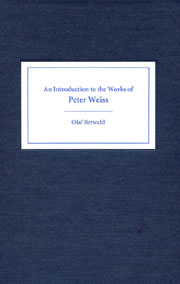Book contents
- Frontmatter
- Contents
- Acknowledgments
- Introduction
- 1 Subversive Slapstick: The Early Plays Der Turm, Die Versicherung, Nacht mit Gästen, and Mockinpott
- 2 The Choreography of Documents: Die Ermittlung, Gesang vom Lusitanischen Popanz, and Viet Nam Diskurs
- 3 Staging Writers as Outcasts: Marat/Sade, Trotzki im Exil, Hölderlin, Der Prozess, and Der neue Prozess
- 4 Scenarios of Stagnation: Early Prose
- 5 Autobiography and Fiction: Abschied von den Eltern, Fluchtpunkt, and Rekonvaleszenz
- 6 Poetics and Politics: Essays, Open Letters, and Fragments
- 7 Perception as Resistance: Die Ästhetik des Widerstands
- Works Consulted
- Index
3 - Staging Writers as Outcasts: Marat/Sade, Trotzki im Exil, Hölderlin, Der Prozess, and Der neue Prozess
Published online by Cambridge University Press: 05 February 2013
- Frontmatter
- Contents
- Acknowledgments
- Introduction
- 1 Subversive Slapstick: The Early Plays Der Turm, Die Versicherung, Nacht mit Gästen, and Mockinpott
- 2 The Choreography of Documents: Die Ermittlung, Gesang vom Lusitanischen Popanz, and Viet Nam Diskurs
- 3 Staging Writers as Outcasts: Marat/Sade, Trotzki im Exil, Hölderlin, Der Prozess, and Der neue Prozess
- 4 Scenarios of Stagnation: Early Prose
- 5 Autobiography and Fiction: Abschied von den Eltern, Fluchtpunkt, and Rekonvaleszenz
- 6 Poetics and Politics: Essays, Open Letters, and Fragments
- 7 Perception as Resistance: Die Ästhetik des Widerstands
- Works Consulted
- Index
Summary
This chapter discusses five plays that simultaneously advocate radical political uprisings and criticize hierarchical structures of orchestrated change. These plays examine to what degree economic and political systems can obliterate the dignity of the individual as well as creative thought.
Weiss's most famous play, Die Verfolgung und Ermordung Jean Paul Marats dargestellt durch die Schauspielgruppe des Hospizes zu Charenton unter Anleitung des Herrn de Sade. Drama in zwei Akten (Marat/Sade), first written in 1963 and constantly revised until 1965, premiered in Berlin in 1964, under the direction of Konrad Swinarski. Peter Brook's productions of the play in London (1964) and on Broadway (1965), as well as his film version (1966), have earned the play worldwide success and have led to Weiss's reputation as one of the twentieth century's most important playwrights, along with Beckett and Brecht. Inmates at the prison of Volterra have performed the play from 1993 to 1997 in various cities throughout Italy. Recent productions in Boston (2001), as well as in Berlin, Minneapolis, and Hollywood (2000), document the fact that Marat/Sade is still one of the most played contemporary dramas.
Marat/Sade integrates divergent theatrical traditions of the twentieth century, including Brecht's belief in theater as an incentive to rational political thinking, Beckett's stagings of existence as grotesque and monotonous, and Artaud's concepts of total theater and theater of cruelty.
The boundaries between levels of theatrical reality that are both superimposed on and conflict with one another remain porous and permeable throughout the play.
- Type
- Chapter
- Information
- An Introduction to the Works of Peter Weiss , pp. 33 - 68Publisher: Boydell & BrewerPrint publication year: 2003



